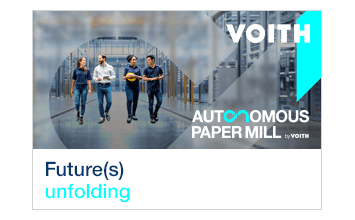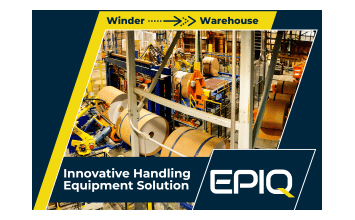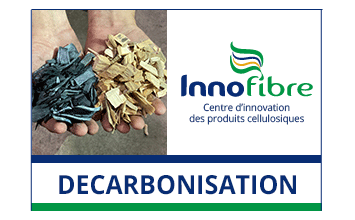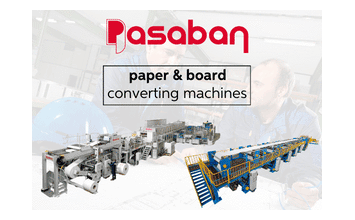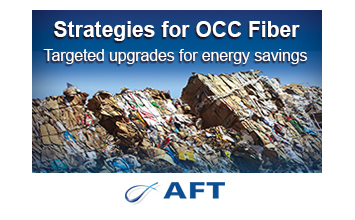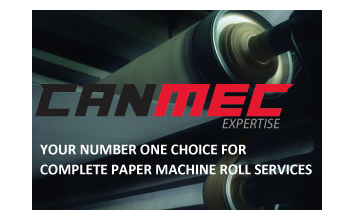As a leading producer of sustainable packaging solutions, Mondi believes that regulatory changes are key to supporting the industry’s sustainability objectives.
The review of the Packaging and Packaging Waste legislation offers such an opportunity, making it all the more important that it is based on a comprehensive assessment of the new rules’ potential risks and unintended consequences.
Recycling and Reuse are complimentary concepts
Mondi strongly believes that recyclability and reuse are complimentary concepts that, when used correctly, can contribute to the EU’s path to circularity. Prioritising reuse is likely to disrupt established, well-functioning paper-based recycling systems in many member states. When deciding between recyclability and reuse, sound scientific evidence about environmental impacts of the product across its full life-cycle need to be the guiding principle.
A focus on reuse, particularly in applications where fibre-based packaging is proven to have a lower environmental footprint than reusable rigid plastic alternatives (e.g. e-commerce and take-away food), may work against the EU and global climate goals. Reuse in food and e-commerce applications will result in significantly more rigid plastic containers, with manufacturing and transport (between consumer, washer and vendor/filler) adding emissions that could be avoided with low carbon fibre-based packaging.
Image illustrates the inefficiency of plastic crates which would need to be reused 63 times to be more efficient than corrugated:
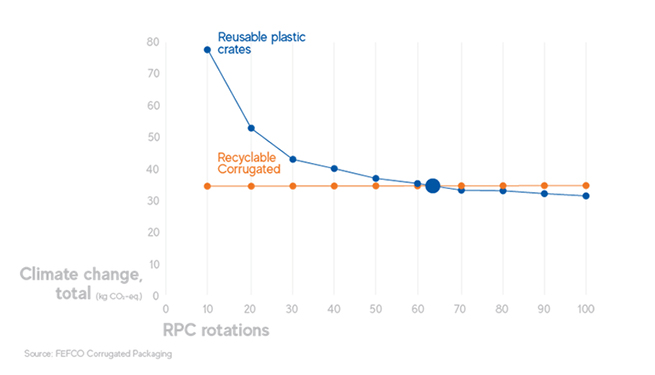
Recycling infrastructure needs to be improved
The main hurdle to boosting recycling is better sorting and collection of materials. Paper and board products already have an average recycling rate of 84% across the EU. Boosting recycling rates, particularly in the flexible and plastic sectors will be crucial to ensure sufficiently high amounts of high-quality post-consumer plastic recyclate. Clear mandates to help member states establish collection, sorting and recycling infrastructure would be beneficial.
Ensuring a functioning secondary raw material market for PCR plastics
While we expect the quantity of PCR plastic to increase over the next few years, targets alone are not enough to ensure a functioning secondary raw material market. Infrastructure and consumer participation are key to PCR content uptake in plastic packaging, alongside enabling conditions. PCR calculation rules should enable new technologies such as chemical recycling to scale up to meet demand for PCR. We ask that policymakers also ensure sufficient legal safeguards are in place if sufficient high-quality PCR is lacking in the marketplace, or material costs are prohibitive. Finally, in relation to recycled content targets, our view is that these should be limited to packaging where plastic is the predominant material.
Flexibility is needed to allow products to be packaged in a fit-for-purpose way
Mondi agrees that over-packaging is an issue however, a one-size fits all approach (e.g. void space limit), is not economically efficient and does not prioritise the functionality of packaging. The shift to reuse requirements is also likely to drive standardisation which overlooks products of different sizes. We believe there should be flexibility to allow products to be packaged in a fit-for-purpose way that provides optimised protection.
Mondi supports an approach to packaging policy that aims to ensure that every packaging application minimises resource use, while maximising protection. As the legislative process of the Packaging and Packaging Waste Regulation continues, Mondi urges policymakers to maintain a balanced approach that truly supports our collective sustainability goals for a circular economy.
Source: Mondi




